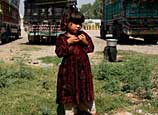
China will invest 4.7 trillion yuan ($767 billion) in road projects by 2030, strongly boosting the domestic economy, a senior official said on Thursday.
The country will have more than 400,000 kilometers of national roads and highways by 2030, compared with 173,000 km by 2012, Dai Dongchang, chief planner of the Ministry of Transport, said at a news conference.
The conference released a national plan for the country's road network from 2013 to 2030, approved by the State Council in May.
Dai said that about 2.5 trillion yuan would be allocated to highway construction, with the remainder going to non-toll roads.
He added that the funds would mainly come from government coffers, while diversified investment will also be encouraged in highway construction.
According to the ministry, every 1,000 km of highway requires around 1 million metric tons of steel, 9 million tons of cement and 800,000 tons of asphalt.
"Road projects play a significant role in guaranteeing the country's steady economic growth," Dai said.
When the global economic crisis erupted in 2008, around 1.5 trillion yuan was allocated to building railways and roads, accounting for 37.5 percent of the government's 4 trillion yuan economic stimulus package.
Huang Min, director of the basic industry department of the National Development and Reform Commission, said: "One obstacle confronting the nation's urbanization plan is that road coverage in China is far from sufficient and fails to meet the needs of rapid economic development and urbanization," Huang said.
Premier Li Keqiang has called for people-oriented urbanization, which is not simply about building larger cities, but the balanced development of small, medium and large cities across the country, which requires more infrastructure projects, especially roads.
Studies by the ministry showed that the country's urbanization program and economic development would drive people's demand for roads by three to four times the current level.
"The pressure that China faces in its road construction is unprecedented globally due to its large area and population," Dai said.
So far, around 900 of the nation's 2,800 counties are not linked to national level roads, which has a negative impact on their economic development, according to the ministry.
Huang said the national plan would prioritize road projects in those areas, mainly in western regions, and poor or remote areas of the country.
Dai said that the road construction projects would respect the environment and avoid ecologically fragile areas.
"Every road project will have to pass a strict environmental impact assessment prior to construction," Dai said.
















 A hemophiliac and his 'treasures'
A hemophiliac and his 'treasures'


![]()
